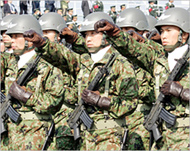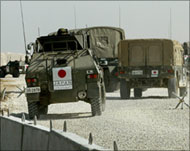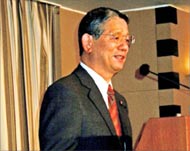Japan plays down talk of militarism
Foreign Minister Nobutaka Machimura has dismissed suggestions that militarism is again on the rise in Japan.

He said this in an apparent rebuttal of claims to this effect by left-wingers at home as well as some of Japan’s neighbours in East Asia who regard the presence of Self-Defence Forces in the Middle East as an indication that Japan is again flexing its military muscles.
“Some people still say it shows the rise of militarism to send troops overseas,” Machimura said.
He has been foreign minister only since September but paid a swift visit to Japanese troops in the southern Iraq city of Samawah earlier this month to see for himself the situation in the region.
“The people who say that are totally wrong. Where can you see militarism in Japan? Do I look like a militarist?” Machimura said.
Imperial past
Newspapers in China and Taiwan have run articles in recent months questioning whether Tokyo’s apparent desire to be more active in overseas operations and to play a larger role in the United Nations signify something far more sinister.
 |
|
Japan’s Self-Defence Forces are |
Memories in Asia go back a long way and the modern generation in all the countries that were invaded and colonised by imperial Japan in the early decades of the last century are frequently reminded, through the education system and media, of the years of oppression that their forefathers endured.
Within days of his visit to the Middle East, along with Liberal Democratic Party Secretary-General Tsutomu Takebe, the Japanese government had decided to extend the SDF’s mandate to continue its work in Iraq for another year.
Facing reality
In talks on 23 November in Egypt among the Group of Eight nations and countries from the Middle East, “We discussed the role that Japan can contribute to rebuilding Iraq and contributing to peace in the region,” Machimura said.
“The people who say Nobutaka Machimura, |
“These nations said they want Japan to play a major role there and I realised that is the reality we face today,” he said.
“Since 1990, after the end of the first Gulf war, Japan has changed the activities that it takes part in overseas.
“Up until then, it was unthinkable that the SDF would be dispatched overseas because of the debate at home.”
Instead, Japan provided Y1.2 trillion and a fleet of minesweepers to operate in the Gulf – although these gestures were under-appreciated, he suggested.
Rebuilding focus
Since then, however, the Japanese government has passed new legislation that allows the military to operate overseas, although its role is limited to humanitarian relief work. In the intervening decade, Japanese troops have taken part in peace-keeping operations in Cambodia, East Timor and the Golan Heights.
 |
|
Machimura: Japan has to expand |
“Japan has to expand the scope of its international activities,” Machimura said.
“Not in terms of combat, but being involved in rebuilding and repairing the areas involved. But the fact that we are engaged in these activities has led other countries to claim that Japanese militarism is being revived.”
He also emphasised that Japan’s intent in the Asia-Pacific region is to ensure peace and security, but that there are many potential pitfalls among the dynamics of the various nations of the region, not least the troubled bilateral relationship with Beijing, which took another twist last week.
Machimura dismissed as unreasonable complaints from Beijing that providing former Taiwan President Lee Teng-hui with a tourist visa would be unacceptable to the Chinese government.
Taiwan factor
Prime Minister Junichiro Koizumi said on 16 December that there is “no reason to reject” the application for a tourist visa on the grounds that the trip is a family holiday. The visa is likely to be granted before the end of the year.
 |
|
Machimura: We will not change |
Machimura echoed that support, saying:0 “We will issue the visa if there is an application because he is a civilian and coming as a tourist. He will not be taking part in politics in any way, but China has already filed a complaint.
“This is a very delicate issue but we will not change our position,” he said, adding that it is unreasonable to link the 81-year-old Lee’s visa with the diplomatic situation between China and Japan.
Beijing’s ambassador to Tokyo, Wang Yi, made an official protest to Vice-Foreign Minister Yukio Takeuchi, saying the plan to issue the visa “is unacceptable” because “Lee Teng-hui is a leading figure who is trying to split China”.
Tougher attitude?
Lee last visited Japan in April 2001, when he underwent treatment for a heart complaint, but had already retired from office 11 months earlier.
Previous applications to visit Japan, in November 2002 and in September this year, were turned down by Tokyo, but Machimura played down the suggestion that Japan was adopting a tougher attitude towards Beijing.
“What we need to do is come up with proper answers to each of the questions that we face and resolve them one by one,” he said.